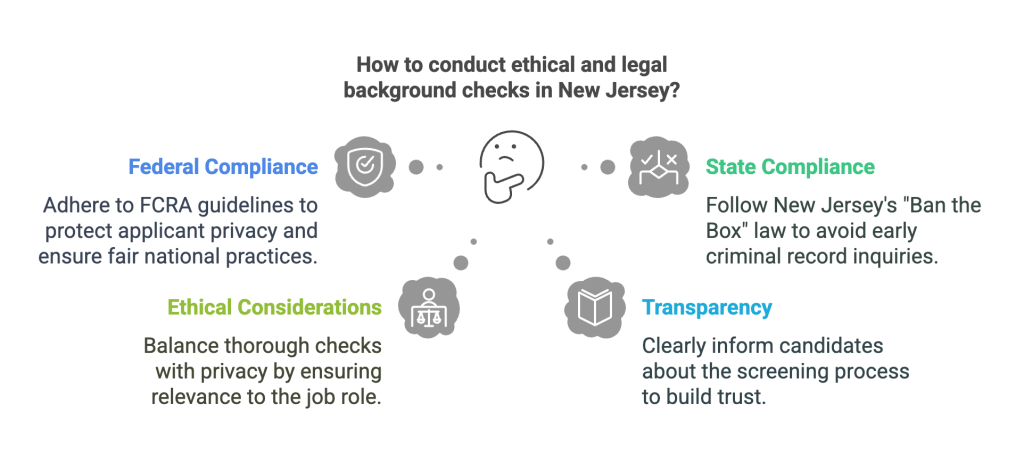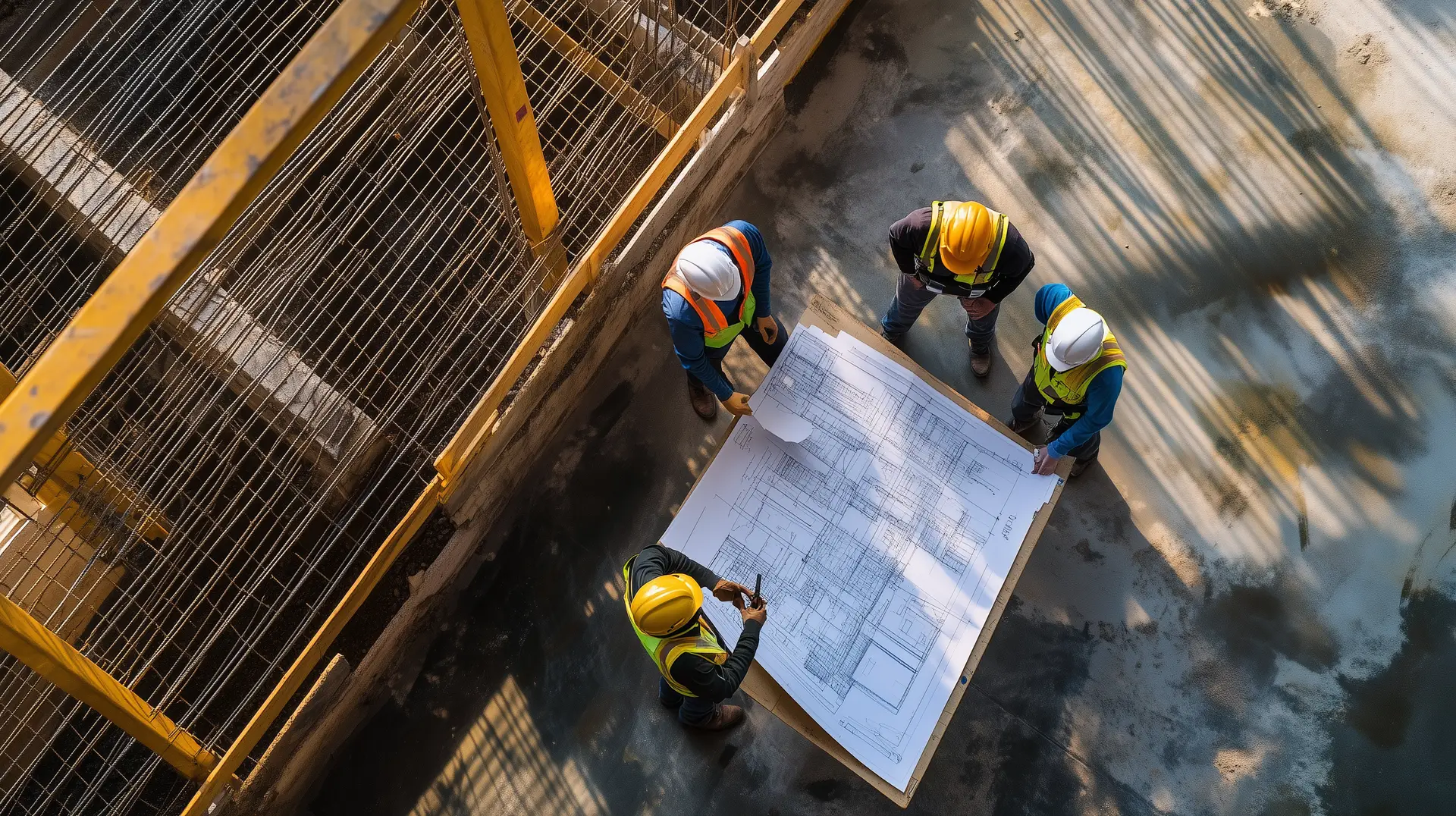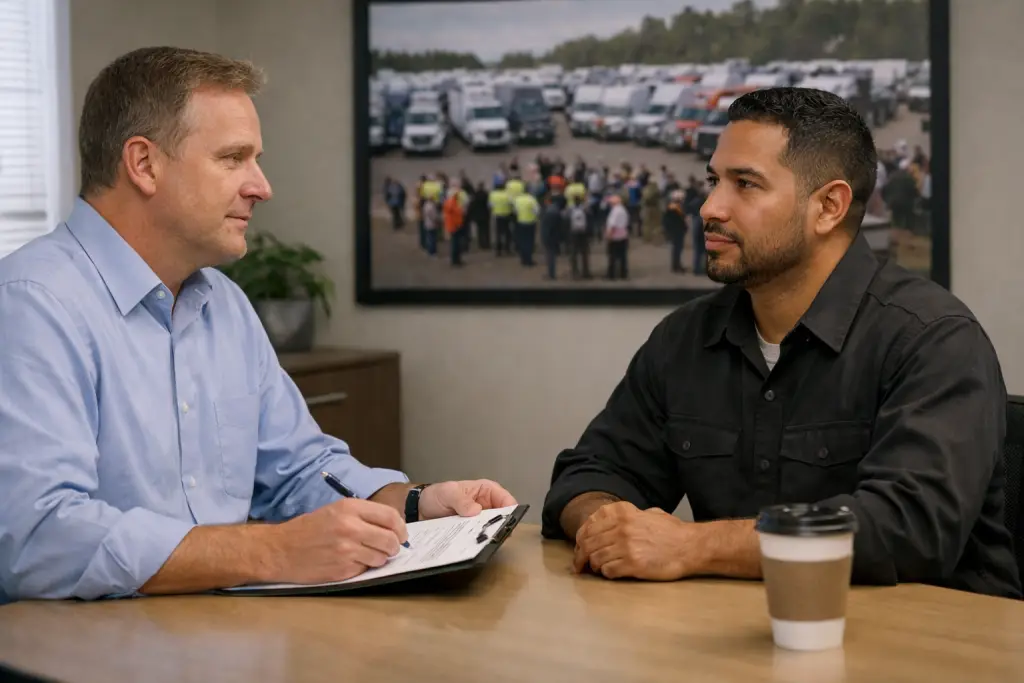Background checks are a staple in the hiring process across numerous industries; however, few are as stringent and necessary as those in the construction industry. In New Jersey, this is particularly true, where both OSHA compliance and construction union regulations play a crucial role in ensuring safety and workforce integrity. So, let's dig into the essentials of background checks in the New Jersey construction industry.
Key Takeaways
- Effective background checks are essential to ensuring safety and compliance in New Jersey's construction industry.
- Adhering to OSHA and union regulations through thorough worker screening helps maintain workforce integrity.
- Implementing a comprehensive background check process can reduce safety risks and enhance project reliability.
- Legal compliance, such as following the Fair Credit Reporting Act, is crucial to conducting ethical background checks.
- Embracing technology and staying informed about new regulations are vital for improving background check procedures.
Introduction
Background checks serve as a vital checkpoint in the construction industry, particularly in New Jersey. As a field that faces stringent safety and regulatory demands, construction can't afford slip-ups when it comes to hiring. That's where background checks come in. They help verify that potential hires aren't just skilled but also comply with necessary safety and legal standards.
In New Jersey, the construction sector operates under the watchful eyes of OSHA and robust union regulations. These regulations don't merely ensure compliance; they underscore the importance of safeguarding the integrity and safety of the workforce. As a guide through this intricate process, understanding these requirements is crucial for construction companies aiming to maintain a competent and reliable team. Thus, this piece will lay out the essentials, from the nitty-gritty of OSHA compliance to union standards, providing a well-rounded look at what background checks entail in this demanding landscape.
Understanding New Jersey Construction Background Checks
To hire effectively in the New Jersey construction industry, background checks are not just helpfulâthey're essential. These checks ascertain whether a candidate possesses the right qualifications, relevant experience, and a clean criminal record. It's about more than just past job titles; it's looking at a person's history critically to place the right people on the job site.
Construction in New Jersey is rigorous, with substantial emphasis on safety and integrity. This means checking credentials such as certification, licenses, and references to confirm that applicants can meet the demands of the role. Discrepancies or omissions in these areas can be red flags. For example, if someone claims to have an OSHA certification but can't produce proof, that's a gap you cannot ignore.
Criminal background checks are equally important. They help ensure that no legal issues could pose risks to safety or security. These checks can range from verifying any severe offenses to scrutinizing financial integrity for specialized roles handling significant cash flows or materials.
Industry standards offer a blueprint for conducting these background checks. The Professional Background Screening Association might suggest a multi-tiered approach that includes social security verification, reference checks, and drug testing. While every applicant is unique, maintaining a consistent process guards against bias and helps uphold fairness and objectivity.
Background checks are tools that, when used effectively, add a layer of assuredness in the hiring process. Knowing who you're hiring not only helps in operational areas but also in maintaining a lawful and ethically sound standing within both OSHA regulations and union requirements. Have you thought about all the pieces you need to secure an efficient and compliant team?
NJ OSHA Compliance
OSHA plays a critical role in the construction industry. Its primary mandate is to ensure safe working environments. In New Jersey, OSHA compliance isn't just a regulatory requirement; itâs a vital component of workforce safety and accountability.
Background checks are intertwined with OSHA's focus on safety. Ensuring that workers don't have a history of negligent behavior is crucial for maintaining job site safety. They help in confirming that every worker on site has the required qualifications and training specific to New Jersey standards. For instance, workers often need to complete a 30-hour safety course specific to their role, which a background check can verify.
Compliance with OSHA also requires checks on past violations. A worker's history with OSHA violations could signal potential risks. Employers need to be thorough in their checks, as neglecting this can lead to non-compliance penalties.
Think about the training and certifications required in the construction industry. These aren't just nice-to-havesâthey are essential. For example, a worker operating heavy machinery without proper certification poses a risk to everyone on site. Certification checks are part of ensuring that all employees contribute to a culture of safety.
Are your current background checks meeting OSHA standards? Do they cover all areas of past employment and certification validations? If not, it might be time to re-evaluate your process. Ensuring OSHA compliance through comprehensive background checks not only protects your company from fines but more importantly, keeps your workers safe.
Construction Union Screening in NJ
Unions play a core role in shaping worker standards in New Jersey's construction sector. These organizations establish criteria for entry and ensure workers meet them before stepping onto a job site. Union rules are clear: they aim to protect workers and maintain industry standards.
The screening process typically begins with membership prerequisites. For starters, candidates often need to provide proof of relevant experience and any certifications they might hold. A clean criminal record can be essential, and it's common for unions to conduct comprehensive background checks to verify this. Some unions go further, requiring drug tests or physical assessments to ensure the candidate's readiness for the demands of construction work.
Unions don't act alone. They work directly with employers to make sure all standards are met. Together, they craft agreements that align the interests of all parties, ensuring both safety and compliance are upheld. Employers learn quickly the value of these collaborations. Working with unions helps maintain a consistent workforce, ready and qualified to tackle the rigorous tasks of the construction industry.
These partnerships between unions and employers not only standardize worker quality but also create a buffer against liability. When everyone follows the same rules, the risk of accidents drops and project efficiency rises. The union-employer relationship is therefore more than a procedural task; it's a strategic alliance crucial for maintaining high safety and performance standards.
Are you engaging in union screening for your construction projects? Connecting with local union chapters can streamline the process and ensure you're following best practices. They have tried-and-tested procedures that you can adapt to fit your needs, simplifying the road to compliance and quality control.
Legal and Ethical Considerations
Effective background checks in New Jersey require adherence to both federal and state laws. You must navigate regulations that protect applicant privacy while ensuring safe hiring practices. The Fair Credit Reporting Act (FCRA) is a key piece of legislation here. It governs how background checks are conducted nationally. Compliance involves obtaining written consent from candidates before running checks and providing them with a copy of the report if any adverse action is taken.

Beyond federal laws, New Jersey has its own guidelines, emphasizing the importance of fair hiring. The New Jersey Opportunity to Compete Act, known as the âBan the Boxâ law, restricts employers from inquiring about criminal records during the initial job application process. This means you cannot ask about or consider criminal history until after the first interview, ensuring that candidates aren't unfairly excluded early in the hiring process.
Ethically, balancing thorough checks with privacy is crucial. This involves considering the relevance of certain checks to the job role. For example, a driving record may be pertinent for a driver position but irrelevant for an office job. Ensure that the depth of your screening is justified by job-related requirements. This approach respects candidate privacy while obtaining necessary information.
Moreover, transparency is fundamental. Clearly inform candidates about the screening process, what it involves, and their rights under the law. This builds trust and aligns with ethical standards. Legal compliance coupled with ethical practices creates a fair environment for candidates while protecting your company from potential legal issues. Do your background checks uphold these values?
Implementing a Comprehensive Background Check Program
Start with a clear plan. Determine what you want to achieve with your background checks. This could include verifying skills, ensuring safety, or reducing risk.
First, craft a checklist of all required elements. In the construction sector, this often includes verifying identity, past employment, criminal history, and any necessary certifications.
Develop a timeline for implementing the program. Decide on how often you'll conduct checks and the specific points in the hiring process they will occur.
Next, choose a reputable background screening service. Look for one with experience in the construction industry and knowledge of New Jersey laws. Services like those from the Professional Background Screening Association can offer valuable guidance.
Train your HR team. They should understand the legal requirements, such as compliance with the Fair Credit Reporting Act, and know how to interpret screening results accurately.
Ensure transparency with candidates. Inform them of the background check process from the outset. Obtain their consent and explain how their information will be used.
Integrate checks into your hiring workflow. Use software solutions to manage this process seamlessly, ensuring checks are completed promptly without disrupting other hiring activities.
Continuously review and update your program. New regulations and industry standards may necessitate changes. Regularly evaluate the effectiveness of your checks in meeting your goals.
By taking these steps, you position your company to maintain high standards for safety and reliability in the construction industry.
Challenges and Solutions
Background checks in New Jersey's construction industry can be tricky. Many employers face common hurdles, but you can tackle these with the right approach.
One major challenge is compliance with both federal and state laws, like the Fair Credit Reporting Act (FCRA) and local privacy regulations. Each has specific requirements that can seem overwhelming. To navigate this, consider working with legal experts who specialize in employment law. They can help keep your processes updated and compliant.
Another issue is the time and cost of thorough background checks. Employers might rush to fill positions and skip necessary checks, risking safety and compliance. To solve this, create a clear hiring timeline that includes background checks without affecting your project schedules. Additionally, set a budget that accounts for the costs of quality screening services, as shortcuts here can lead to bigger problems down the line.
Data accuracy is also critical. Inaccurate background checks can lead to unfair hiring decisions. Partnering with reputable screening firms that verify data through reliable sources can minimize this risk.
Finally, balancing thorough screening with respecting applicant privacy is key. Make sure your background check process is transparent. Clearly inform candidates about what will be checked and why. This builds trust and keeps you within legal limits.
By addressing these challenges head-on, you ensure efficient hiring and a workforce that meets safety and integrity standards.
Conclusion
Comprehensive background checks stand as an indispensable tool in maintaining workplace safety and compliance. In the context of New Jersey's construction industry, aligning with both OSHA and union rules is non-negotiable. Key insights from this discussion emphasize the need for systematic verification of worker qualifications, ensuring adherence to local and federal regulations.
Efficient background checks not only reduce the risk of safety violations but also enhance overall project integrity. As technology advances, so too do the means of conducting these screenings. We can expect to see further integration of automated systems and more nuanced regulations in the future, aimed at bolstering safety and transparency. Staying informed on these developments will be crucial for New Jersey construction participants striving to maintain high standards of workforce vetting and safety compliance.
Frequently Asked Questions (FAQs)
What disqualifies you from construction work in NJ?
Certain criminal convictions, lack of necessary certifications, or failing drug tests may disqualify you.
Do NJ unions require background checks?
Yes, many unions in NJ conduct background checks to ensure a safe and compliant work environment.
Can a felony prevent union membership in NJ?
A felony can impact your eligibility, depending on the nature and recency of the offense.
How often do NJ construction sites drug test?
Drug testing frequencies vary. Some sites test randomly or upon suspicion, while others have regular testing schedules.
Are OSHA violations visible on NJ background checks?
OSHA violations may appear if they are part of a public record search during a background check.
Can you work construction with a DUI in NJ?
A DUI may not bar you entirely, but it could limit specific roles, especially those involving driving.
Do independent contractors need checks in NJ?
Independent contractors might face checks from clients, especially if safety-sensitive work is involved.
How to verify OSHA certifications in NJ?
You can verify through the OSHA Outreach Training Program or by contacting the training provider.
Are expunged records considered for NJ union jobs?
Typically, expunged records should not affect union job prospects, as they are not visible on standard checks.
Whatâs the cost of NJ construction checks?
Costs vary, but expect to pay between $20 and $100 for a comprehensive background check.
Are there age restrictions for construction work in NJ?
Yes, generally, you must be at least 18 for most construction roles due to safety regulations.
Is a high school diploma required for construction jobs in NJ?
Not always, but having one can improve job prospects and eligibility for training programs.
How can I find construction apprenticeships in NJ?
Contact local unions, trade schools, or check online for apprenticeship opportunities near you.
Do NJ construction jobs require safety training?
Yes, many require OSHA training or similar safety courses to ensure compliance and worker safety.
Definitions
OSHA Compliance
Meeting Occupational Safety and Health Administration (OSHA) standards means your company follows required safety rules set by federal and New Jersey regulations. In construction, this often includes verifying safety training like the 30-hour OSHA course, keeping records of past safety violations, and ensuring all employees work in safe conditions. It's not just about avoiding finesâit helps keep your job sites safe and your teams properly trained.
Criminal Background Check
This is a review of a candidateâs criminal history to assess if they pose any risks in the workplace. In construction, this may involve checking for past convictions that could impact safety, security, or trustâsuch as theft, violence, or substance abuse. These checks are especially important for roles involving heavy machinery, financial responsibility, or access to sensitive areas.
Certification Verification
This involves confirming that a candidate holds required professional or safety certifications, like an OSHA card or machinery operator license. In New Jerseyâs construction industry, certain roles demand specific documents as proof of training or skill level. Verifying these details helps you ensure employees are legally allowed to perform the tasks assigned to them.
Union Screening
Union screening is the process of ensuring candidates meet requirements set by local construction unions. This typically includes confirming prior experience, certifications, and sometimes passing a drug test or medical evaluation. Employers and unions work together to confirm that only qualified individuals are sent on site, helping maintain safety and performance standards.
Fair Credit Reporting Act (FCRA)
The FCRA is a federal law that regulates how background checks are done. Before running a report, you must get written consent from the candidate. If the report results in a hiring decision, youâre also required to notify them and share the report. Following FCRA rules helps protect candidate rights and shields your business from legal risk.
Reference
- Shore News Network NJ Construction Worker Background Check Legislation:
https://www.shorenewsnetwork.com/2024/06/09/construction-workers-in-new-jersey-public-schools-need-background-checks-lawmakers-say/

GCheck Editorial Team
Meet the GCheck Editorial Team, your trusted source for insightful and up-to-date information in the world of employment background checks. Committed to delivering the latest trends, best practices, and industry insights, our team is dedicated to keeping you informed.
With a passion for ensuring accuracy, compliance, and efficiency in background screening, we are your go-to experts in the field. Stay tuned for our comprehensive articles, guides, and analysis, designed to empower businesses and individuals with the knowledge they need to make informed decisions.
At GCheck, we're here to guide you through the complexities of background checks, every step of the way.






